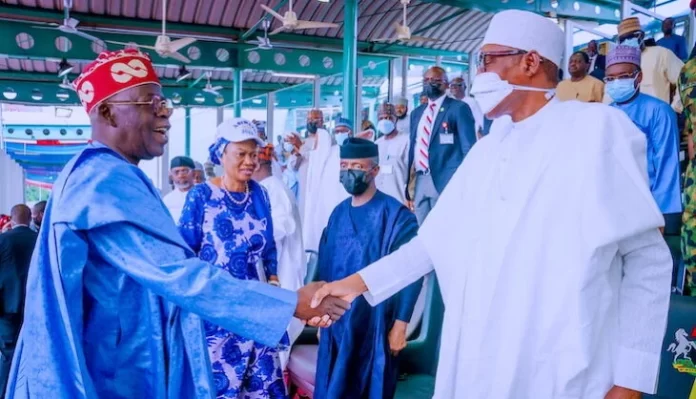The bells are tolling, signalling the end of one era and the beginning of a new era. On May 29, President Muhammadu Buhari will become history and Bola Ahmed Tinubu will become history in the making. The change is consistent with our traditional concept of political power, to wit, no be only one man go chop. Buhari’s men and women will be entitled to a new prefix as either ex-this or former-that. Life.
The heavy human traffic of important men in expensive babban riguna flowing into Defence House, Abuja, is the story of the moment. These important men are transiting from the passing era to the new era where continued political relevance matters. Time to whisper in the ears of the president-elect to promote oneself.
Each man is oiling his continued political relevance. Political irrelevance is a killer disease dreaded by all politicians. But each man must contend with it for the simple reason that the unalterable law of nature is that stagnation is bad for the health of human progress. So, toeing and froing is the fate of nations and it is the destiny of individuals.
Tinubu has offered to renew our hope. For our sake as a nation, I take it that his promise has moved from the billboards into his study where he is putting together his thoughts on renewing our hope in our nation and its leaders at all levels. The task before him in renewing our hope is so enormous, so complex and so complicated that he has everything to gain by not wasting the next 29 days swimming in the flood of the human traffic.
The president-elect must be by now swamped in an avalanche of new and refurbished ideas offered in good conscience by patriotic Nigerians who want him to succeed in the enormous task of rebuilding a broken nation and uniting the people, whatever may be the differences in tribes, tongues and religious faiths. It is a good thing that Nigerians never need to be reminded that each one of us has a fundamental role to play in helping our leaders in nation-building.
So, as a patriotic senior citizen, let me add my droplets to the flood of suggestions, solicited or freely given, to Jagaban on what he should do to renew our hopes as he grapples with the challenges of drawing up a road map for hope renewal. I wish to suggest that when he assumes office, he should do what no one before him had done. I suggest he should look back and see where we came from up to this point. It may sound odd but I believe doing so will help him see what went wrong in the past.
I am saying nothing new when I say that we hate history because we believe that what is past is past. This is part of the bane of our national development and progress. Each president believes that the country begins with his administration. It is naïve, foolish even, but it has been hardened into a tradition. The idea that government is a permanent institution and every administration is temporary is rather irritating to a new president who believes that his right to be seen as the messiah cannot be taken away from him because of something called history. As it is in the centre, so it is in the constituent states.
Our leaders, past and present, are past masters at seeking solutions to the myriads of our national problems. They set up panels or commissions or committees and tasked with finding solutions to those problems. But today, federal and state government shelves are full of reports and recommendations of panels, commissions and committees that jaw-jawed on the problems and offered informed views on their solutions. They are caked with the dust of neglect and abandonment. Still, our leaders are in vigorous search of solutions to the same problems because doing so is cynically regarded as performance.
Tinubu can do it differently. He can start by acknowledging the role of history or the past in human progress. He needs to know if the past is holding us back. If it is, we can make but cosmetic rather than real or radical progress. I refer Jagaban to the following reports consigned to the cold Siberia of indifference. Each of these reports contains the seeds of solutions to various aspects of the problems and the attitudes that keep our nation chained to the millstone of its inertia and the apparent insincerity of those who sought for the solutions but had no intentions of applying them to the problems.
In 2006, President Olusegun Obasanjo convened a national conference packed with men and women whose desire was to see the nation released from its chains. The conference foundered on Olumo rock when suspicion gave way to the confirmed fact that the president’s primary objective was for the conference to recommend a third term for him. A disappointed president dumped the report of the conference on the senate. I believe that given the calibre of men and women who answered the nation’s call to find collective and informed solutions to what ails the nation, there is still much that is relevant in it. It should be rescued from the shelf.
Soon after he took office on May 29, 2007, the late President Umaru Yar’Adua , worried by the conduct of the election that bought him into the exalted office, decided to reform the electoral system to make way for free, fair and credible elections. He appointed a committee headed by the former Chief Justice of Nigeria, Justice Muhammadu Uwais, to tell him what was wrong and recommend wholesome electoral reforms to ensure that no president after him would be the product of flawed elections.
It was a committee of eminent Nigerians – renowned scholars, technocrats, religious leaders and professionals who had seen it all and believed that with the reforms we could do much better as a nation. When we lost the president to death, his vice-president, Dr Goodluck Jonathan stepped into his shoes. Jonathan was a party to the Uwais committee but he would not touch the report with his walking stick. He had to carve his own path through the jungle of our national politics. Why would anyone expect him to finish what his late principal could not?
We lost a chance to reform the electoral system. Had the excellent recommendations of the committee seen the light of day, the INEC chairman, Professor Mahmoud Yakubu, would have had a much easier time of it and the courts would not be required to cast the deciding vote in disputed election cases. The report still has some relevance to how we manage our elections.
In 2013, Jonathan convened the national political reform conference. Again, it was packed with eminent Nigerians from various walks of life – academicians, retired generals from the army, the navy and the air force, retired inspectors-general of police, technocrats, etc. Again, the conference did a fine job within and without the limits of its terms of reference. Jonathan had no intentions of implementing the report. He ignored it. His job was done when he set it up. It is impossible to find a more cynical attitude by a president who desired to do good by his nation. If Tinubu recovers it from the shelf, he will see much that is in accord with his pursuit of renewed hope.
In 2018, APC set up a committee headed by the governor of Kaduna State, Nasir Ahmed El-Rufai, to draw up a road map for the party and the government birthed by it to respond to the many things agitating the country and its people, as in restructuring, to end the anomaly of centralised federalism, among other critical issues. The committee did its work with all seriousness. I have read and re-read it and know that the committee offered the administration ways to make a better job of running the country. But true to character, this excellent report and its recommendations suffered the same indignity of abandonment by those who set up the committee.
With our history of running away from solutions to our problems, how can we solve them and move the nation towards where it should be? Tinubu can end this run of indifference in our national affairs by recognising that if we do not settle our past, we will remain chained by it.
It takes one man to change a nation. It takes courage for one man to be that one man.



